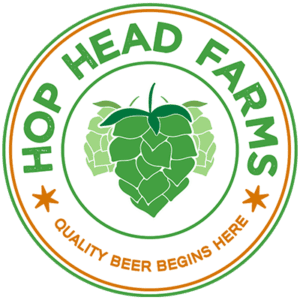Unearthing the Roots of Chinook Hops:
The story of Chinook Hops begins with their creation in the USDA breeding program in Washington State back in 1985. Initially bred as a bittering hop, Chinook has since proven its mettle as a dual-purpose hop, ideal for a diverse range of beer styles. Its defining features include prominent spicy and piney notes that carry through to both flavor and aroma, along with bright grapefruit accents that enhance its clean bitterness.
Notably, Chinook Hops boasts a higher Geraniol content, which undergoes a yeast-driven transformation into Citronellol, a prized aroma compound often sought after in fruit-forward IPAs.
The Versatile Appeal of Chinook Hops:
Chinook hops are versatile and can be incorporated at various stages of the brewing process. While they are a natural fit for American-style Pale Ales and IPAs, they also find their way into seasonal ales, barley wines, porters, and stouts. This adaptability has endeared them to brewers and craft enthusiasts alike.
The lineage of Chinook is an intriguing blend, a cross between Petham Golding and a USDA male hop variety, offering a distinct pine-like, spicy aroma complemented by robust grapefruit flavors.
Brewing with Chinook Hops:
The rise of craft breweries has witnessed a surge in Chinook’s popularity. It is prominently featured in renowned brews like Stone’s Arrogant Bastard and Sierra Nevada’s Celebration Ale, where its piney and citrusy character shines.
Chinook alpha acids content is high, making them a favorite for crafting bold and hoppy beers, such as IPAs and American-style ales. This versatility makes Chinook Hops a sought-after choice for brewers looking to create a wide array of beer styles, from ales to barley wines.
The Origin and Availability of Chinook Hops:
Chinook Hops are deeply rooted in the Yakima Valley of Washington state, and the majority of their annual supply comes from this region. While they also adapt to Oregon and Idaho, Washington remains their primary habitat. Due to specific challenges, such as downy mildew and the risk of combustion due to high alpha acids, Oregon saw a lapse in Chinook Hop cultivation for about twenty years. However, recent years have witnessed a slow resurgence of Chinook in Oregon, marking a hopeful return.
Chinook hops are commercially available and can be acquired without restrictions, making them an excellent choice for home gardeners. Their resistance to diseases and minimal care requirements make them an ideal pick for those looking to grow hops in their backyard.
Chinook Hops Flavor Profile:
Chinook Hops offer a sensory adventure with slightly spicy and smoky-earth qualities, punctuated by an impressive pine and resin character, all underscored by distinct grapefruit notes. Brewers should take note that Chinook’s flavor may take a catty turn when used in excess, and its bitterness can become harsh if over-employed.
Styles of Beer Featuring Chinook Hops:
Chinook Hops showcases remarkable versatility, seamlessly fitting into a broad spectrum of beer styles. They excel in enhancing the flavors of American Pale Ales, India Pale Ales (IPAs), and American Stout. Additionally, they contribute their unique qualities to Porter, Lager, Barley Wine, and Winter Ales, establishing themselves as a prized asset within the craft beer industry.
Comparing Chinook and Columbus Hops:
Chinook and Columbus Hops share some similarities, making them suitable substitutes in certain brewing scenarios. Both possess high alpha acid content, making them excellent choices for imparting bitterness to beer. However, Chinook Hops tend to bring more distinct pine and grapefruit notes to the table, while Columbus Hops lean towards a more earthy, dank, and resinous flavor profile. Brewers often select one over the other based on the specific flavor characteristics they desire in their brew.
New Zealand Chinook Hops:
New Zealand Chinook Hops are a variation of the classic Chinook variety adapted to the unique terroir of New Zealand. While they share some core characteristics with their American counterpart, they may exhibit subtle differences influenced by the local growing conditions. Brewers interested in experimenting with New Zealand Chinook Hops can anticipate flavors reminiscent of pine, spice, and grapefruit, with potential nuances shaped by the Kiwi environment.
Growing your Own Chinook Hops:
For those intrigued by the idea of cultivating Chinook Hops in their backyard, success awaits with proper care and attention. Chinook Hops thrive in dry, hot climates but can adapt to various environments with moderate humidity. They feature moderate to vigorous growth rates and have medium green leaves. When it comes to yield, expect a moderate output. Chinook Hops are moderately resistant to diseases, but it’s essential to watch out for hop mosaic virus, spider mites, and powdery mildew. Harvesting them requires moderate effort, and their storage retention is fair to good, maintaining around 68% to 70% of alpha acid content when stored at 68°F for six months.
To elevate your brewing game with Chinook Hops, consider experimenting with various beer styles and recipes. Whether you’re aiming for a classic IPA bursting with pine and grapefruit notes or a rich, robust porter with a hint of spice, Chinook Hops can complement your creativity.
The Future of Chinook Hops: Sustainability and Innovation:
As the craft brewing industry continues to evolve, sustainability and innovation become paramount. Beyond the traditional growing regions of Washington, Oregon, and Idaho, Chinook hops have found new homes in places like Michigan, where local terroir imparts unique flavors to the hops. Discover how forward-thinking breweries are incorporating Michigan Chinook Hops into eco-friendly practices and innovative brewing techniques, embracing regional diversity while maintaining the classic characteristics that make Chinook Hops beloved by brewers worldwide.
Beyond Brewing: Chinook Hops in Culinary Delights:
Explore the culinary world with Chinook Hops by infusing their unique flavors into dishes. From hop-infused sauces to Chinook-marinated meats, these hops can add a delightful twist to your culinary creations.
Savoring the Legacy of Chinook Hops:
In the ever-expanding universe of hop varieties, Chinook Hops stands as a testament to the artistry of brewing. Their journey from the Pacific Northwest to international breweries and home gardens reflects the enduring allure of crafting unique and flavorful beers. Whether you’re a brewer, a gardener, or simply a beer enthusiast, Chinook Hops invites you to savor the legacy of this remarkable ingredient in the world of brewing and beyond.




